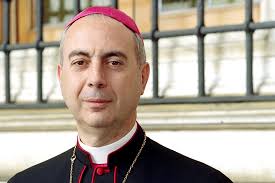The 15 new voting-age cardinals to be elevated in mid-February by Pope Francis reflect his determination not just to bring better balance into the College of Cardinals, but also to allow the “periphery” to shape the “centre”, in accordance with his longstanding thinking on reform.
The 14 nations from which the new cardinals hail are globally diverse, and many of them are poor. Some are bishops of far-flung dioceses. The Kingdom of Tonga, for example, is a Pacific archipelago with just 15,000 Catholics. Its bishop, Soane Patita Paini Mafi, is just 53 and so will be the youngest of the 125-strong College.
Tonga, along with Cape Verde, Mynamar and five other dioceses, have never had cardinals. This is the second time Francis has broken with tradition by giving a red hat to a bishop from a small diocese: at last year’s consistory, for example, the archbishops of Managua (Nicaragua), Abidjan (Ivory Coast), Seoul (Korea) and Les Cayes (Haiti) were made cardinals.
The practice marks a clear departure from the past, when popes have generally ensured that the heads of so-called “cardinal sees” — important dioceses, often major cities — were given priority. Francis has however ignored that tradition, as the Vatican’s spokesman, Father Lombardi, acknowledged in comments to press.
The reason is twofold. The first is to achieve a college of cardinals that better represents the distribution of Catholics in the world. Traditionally, there have been many more cardinals from the wealthy north than the poor south because of the stronger presence of clergy in richer countries, where the priest-to-people ratio is much higher. This has meant that countries with high, and growing, numbers of Catholics have been disproportionately represented.
In the mid-February consistory, there will be five new voting cardinals from Europe, three from Asia, three from Latin America, and two each from Africa and Oceania. In naming Francis Xavier Kriengsak Kovithavanij of Bangkok, Pierre Nguyên V’n Nhon of Hanoi, and Charles Maung Bo of Rangoon, Burma the Pope has bolstered above all the traditionally under-represented Asian presence in the College of Cardinals.
There are none from the U.S. and Canada (North America “has a significant number and that number has remained stable during the past year”, Father Lombardi explained) and only one curial appointment, Dominique Mamberti, who has replaced Cardinal Raymond Burke as head of the Apostolic Signatura. The number of Vatican officials among voting-age cardinals has dropped under Pope Francis: after February, they will make up about 27 per cent of the total, compared to about 35 per cent in the 2013 conclave that elected Pope Francis.
The other guiding principle in these choices has been Francis’s perception, drawn from the theologian Yves Congar’s writings on church reform, that the centre — Rome — of the universal Church needs to listen to and be shaped by views that come from the poor margins, for all “true” church reform, begins, as did Jesus’s ministry, from the peripheries. (On Francis and Congar, see The Great Reformer).
This criterion seems to have been applied in his selection of the Sicilian archbishop of Agrigento, Francesco Montenegro, who welcomed Francis on his first apostolic journey outside Rome in July 2013 to Lampedusa, where thousands of migrants have been left stranded by people-smugglers. Agrigento also includes towns where people have stood up to the mafia dons.
It also applies to Latin America, where Morelia in Mexico (Alberto Suárez Inda) and David in Panama (José Luis Lacunza Maestrojuán) have not been cardinal sees.
Archbishop John Dew of Wellington, New Zealand, is noteworthy because in the 2005 synod he was a prominent critic of the exclusion of the question of access to the sacraments by the divorced and remarried from the synod discussion. Last October, he was effusive in his praise for Francis’s reformed synod.
The new appointments are much more than symbolic, because not only will these cardinals elect Francis’s successor, but they will be asked by the pope to shape the policies of the universal Church. As part of his reforms to church governance, Francis is restoring the college of cardinals to its historic role as a kind of “senate” overseeing major questions.
Last year, in a two-day meeting prior to the consistory, Francis asked the cardinals to deliberate on the issues facing the synod on the family; this year, he will ask them to consider proposals to restructure the Roman Curia that have been drawn up by his advisory group of nine cardinals, known as the “C9”.
It’s in these meetings, not just in the future conclave, that the new “red hats from the margins” will have a chance to affect the shape of the Church for generations.
[Austen Ivereigh]
The list of new cardinals is below. See analyses by John Thavis, John Allen, Joshua McElwee.
- Dominique Mamberti, prefect of the Supreme Tribunal of the Apostolic Signature, Vatican City
- Manuel José Mácario do Nascimento Clemente, patriarch of Lisbon, Portugal
- Berhaneyesus Demerew Souraphiel, archbishop of Addis Ababa, Ethiopia
- John Atcherley Dew, archbishop of Wellington, New Zealand
- Edoardo Menichelli, archbishop of Ancona-Osimo, Italy
- Pierre Nguyen Van Nhon, archbishop of Hanoi
- Alberto Suárez Inda, archbishop of Morelia, Mexico
- Charles Maung Bo, archbishop of Rangoon, Burma
- Francis Xavier Kriengsak Kovithavanij, archbishop of Bangkok
- Francesco Montenegro, archbishop of Agrigento, Sicily, Italy
- Daniel Fernando Sturla Berhouet, archbishop of Montevideo, Uruguay
- Ricardo Blázquez Pérez, archbishop of Valladolid, Spain
- José Luis Lacunza Maestrojuán, bishop of David, Panama
- Arlindo Gomes Furtado, bishop of Santiago de Cabo Verde, Archipelago of Cape Verde
- Soane Patita Paini Mafi, bishop of Tonga
The following, 80 or older and thus ineligible to vote for the next pope, will also become cardinals:
- José de Jesús Pimiento Rodriguez, emeritus archbishop of Manizales, Colombia
- Luigi De Magistris, emeritus Vatican official
- Karl-Josef Rauber, apostolic nuncio
- Luis Héctor Villalba, emeritus archbishop of Tucuman, Argentina
- Julio Duarte Langa, emeritus archbishop of Xai-Xai, Mozambique




